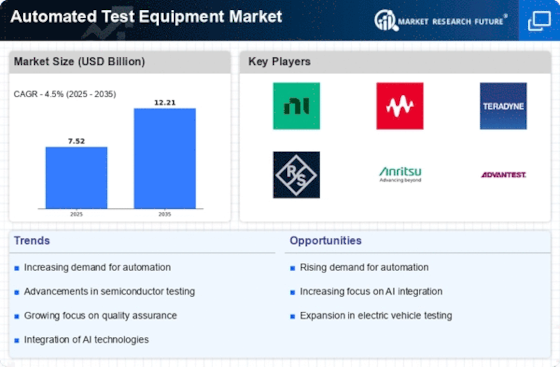Top Industry Leaders in the Automated Test Equipment Market

Competitive Landscape of the Automated Test Equipment Market:
The automated test equipment (ATE) market is a crucial cog in the machinery of modern electronics manufacturing. These sophisticated machines play a vital role in ensuring the quality and performance of electronic components, from tiny semiconductors to complex printed circuit boards. As technology scales down and complexity increases, the demand for advanced and efficient ATE solutions continues to rise, shaping a dynamic and competitive landscape.
Key Players:
- Chroma ATE Inc. (Taiwan)
- Cobham Plc (U.K.)
- Astronics Test Systems (U.S.)
- Agilent Technologies Inc. (U.S.)
- Teradyne Inc. (U.S.)
- Advantest Corporation (Japan)
- LTX-Credence Corporation (U.S.)
- Roos Instrument Inc. (U.S.)
- National Instrument Corporation (U.S.)
- Marvin Test Solution Inc. (U.S.)
Strategies for Dominance:
- Technological Prowess: Leading players prioritize R&D, developing cutting-edge ATE solutions that address the evolving needs of various industries. This includes advancements in areas like Artificial Intelligence (AI)-powered test algorithms, advanced fault detection techniques, and integration with cloud-based platforms.
- Strategic Partnerships: Collaborations with chipmakers, device manufacturers, and research institutions fuel innovation and market access. Partnerships also enable rapid development of customized solutions for specific applications.
- Global Expansion: Established players maintain a strong presence in key manufacturing hubs like Asia and North America, while also venturing into emerging markets like India and Southeast Asia.
Market Share Analysis:
- Application Segments: The market is segmented by application, with the semiconductor industry dominating, followed by consumer electronics, automotive, and aerospace. Analyzing market share within each segment reveals the strengths and weaknesses of different players.
- Geographical Focus: Regional variations in demand and regulatory landscapes influence market share. For instance, players with strong footholds in Asia benefit from the region's booming electronics production.
- Pricing and Product Differentiation: Cost-effective solutions from emerging players challenge established giants. However, premium features and comprehensive support services can still provide an edge for established brands.
New and Emerging Companies:
The ATE landscape welcomes new entrants attracted by the market's growth potential. These startups often focus on niche applications, leveraging innovative technologies like AI and IoT to disrupt traditional approaches. Their success hinges on their ability to offer unique value propositions and cater to unmet needs in the market.
Current Investment Trends:
- Software-Defined ATE: The industry is transitioning towards software-defined platforms that offer flexibility and scalability. Companies are investing in developing open-source platforms and application programming interfaces (APIs) to attract a wider range of users and foster ecosystem growth.
- Cloud-Based Testing: Cloud-based solutions enable remote monitoring and data analysis, enhancing efficiency and collaboration. Companies are investing in secure cloud infrastructure and developing innovative data analytics tools to optimize testing processes.
- AI-powered Testing: AI is revolutionizing fault detection and root cause analysis. Companies are integrating AI and machine learning algorithms into their ATE solutions to improve accuracy, reduce test times, and optimize resource allocation.
Latest Company Updates:
SET GmbH ("SET"), a long-standing leader in the creation of test systems for the aerospace and defence industries as well as a recent developer in the field of power semiconductor reliability testing, was acquired by NI in 2023. By working together, the businesses will shorten the time it takes for vital, highly distinctive solutions to reach the market and hasten the convergence of the semiconductor-to-transportation supply chain using power electronic materials like gallium nitrite (GaN) and silicon carbide (SiC).
The Indian Council of Medical Research (ICMR), the TB Expert Committee, and the Central Drugs Standard Control Organisation (CDSCO) approved Mylab's made-in-India kit in 2022. It can identify multiple drug resistance to isoniazid and rifampicin in addition to tuberculosis with just one test.
The third-generation BD Kiestra Total Lab Automation System was introduced by Becton, Dickinson and Company (BD) in 2023 specifically for microbiology labs. The robotic track system can be used with the automated lab specimen processing BD Kiestra microbiological laboratory solution. The new robotic track system, which is made to adapt to changing laboratory needs, will make it possible to create a unique and adaptable entire lab automation configuration that can connect multiple BD Kiestra modules.










